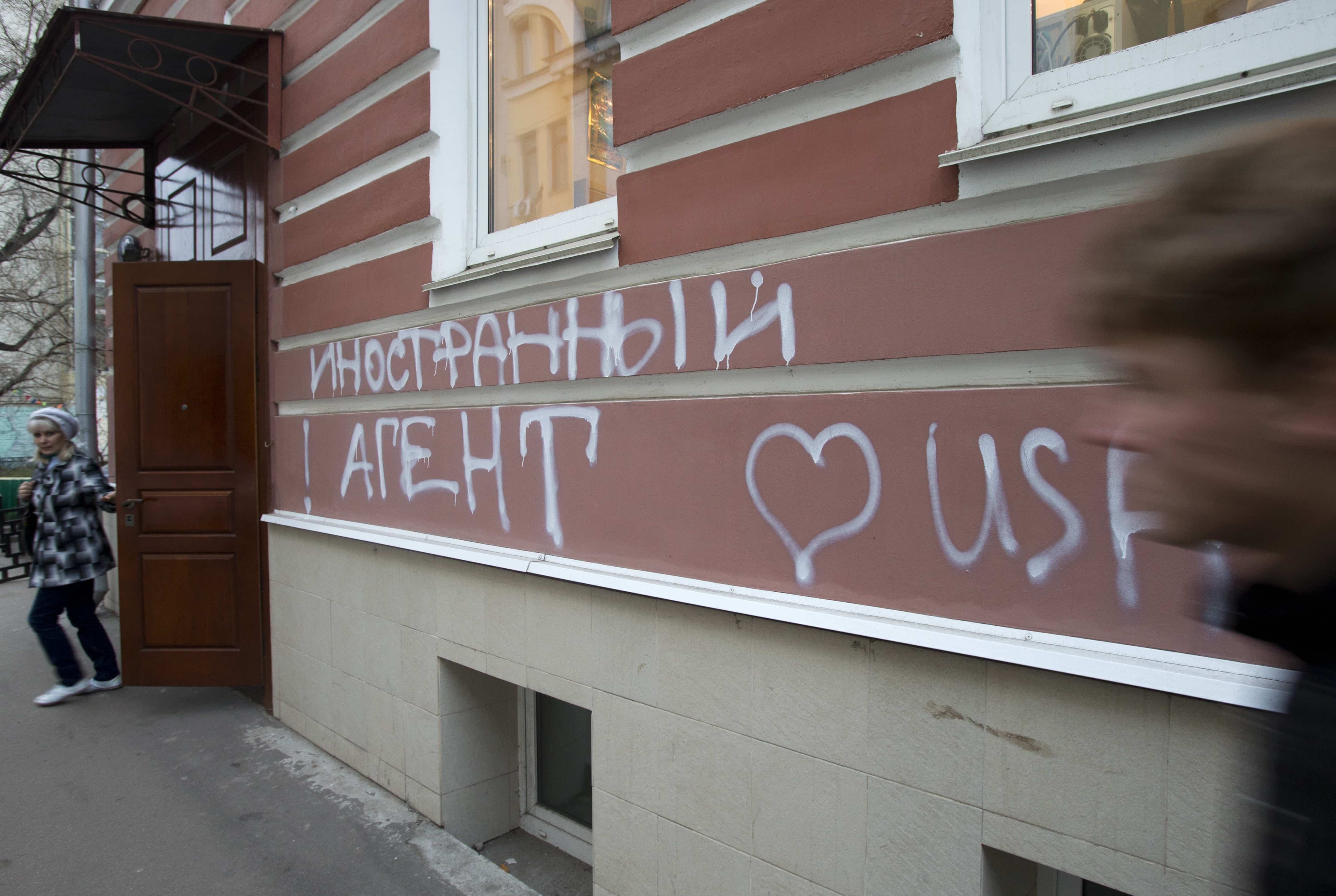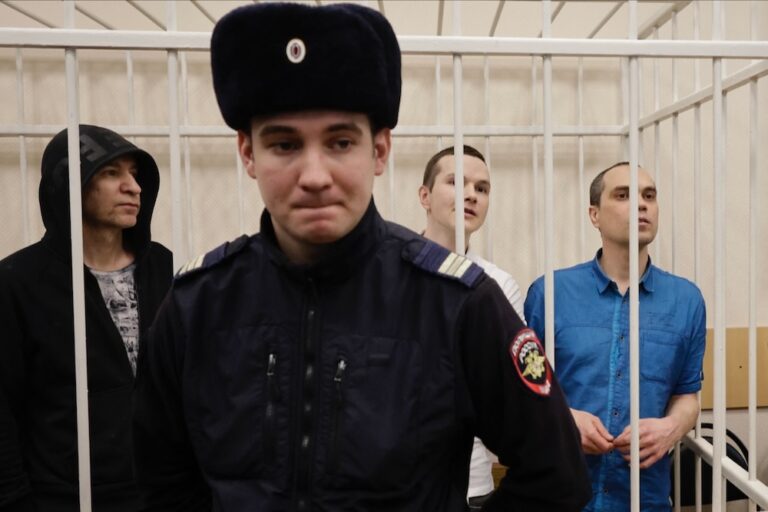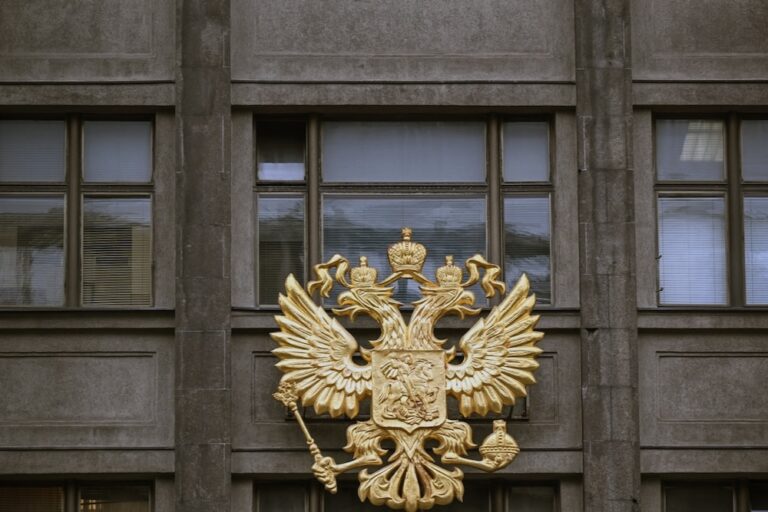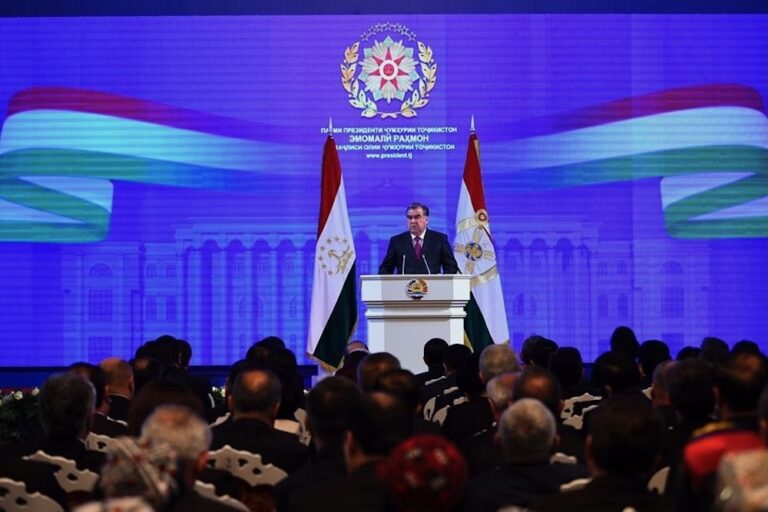While the consequences of being a “foreign agent” in Vladimir Putin’s Russia are not as extreme as they were under Joseph Stalin, they do set some foreboding precedents in the region, namely for Azerbaijan, Kazakhstan and Kyrgyzstan. The trend has directly impacted two IFEX members – the Institute for Reporters’ Freedom and Safety (based in Azerbaijan) and Freedom House (based in the U.S.)
If someone were to ask you to imagine a spy’s headquarters, you’d likely invoke images of sleek, silver staircases, fingerprint-activated doorways and tinted, bulletproof windows.
You probably wouldn’t imagine a mundane, brick and tile building, covered in graffiti.
But to the Russian government, it seems that is exactly what a spy’s headquarters look like.
In 2013, Memorial – one of Russia’s most well-know human rights groups – was raided by police and tax inspectors. Just months earlier, the outside of its office building was graffitied with the words: “foreign agent [loves] USA.”
Both events were products of legislation adopted in 2012, which requires Russian nongovernmental organisations (NGOs) who accept foreign funding and engage in “political activity” to register as “foreign agents.” As Human Rights Watch notes, the term “foreign agent” is generally understood to mean “spy” or “traitor.” In fact, at some of the most repressive points of the Soviet period, the term was used to describe dissidents of Joseph Stalin, and could even lead to execution, according to BBC News.
While the consequences of being a “foreign agent” in Vladimir Putin’s Russia are not as extreme as they were under Stalin, they do set some foreboding precedents – not only for Russia, but also for some of its neighbours, namely Azerbaijan, Kazakhstan and Kyrgyzstan.
Partnered with similarly disconcerting legislation – such as the “homosexual propaganda” law – Russia has started a regional trend that is affecting countless human rights groups. And IFEX members who report on issues in the region are not being spared.
Setting the trend
Since July 2012, approximately 60 groups have been asked by the Russian government to register as foreign agents.
According to Human Rights Watch, failure to do so could get your organisation suspended for six months.
Not only that, but harsh fines and criminal penalties could also apply. Individuals are susceptible to fines up to 50,000 rubles (approximately $840 USD) for failure to submit periodic reports and other information, while NGOs can be fined up to 1,000,000 rubles (approximately $16,800) for doing the same. Serious breaches of the regulations could also result in a criminal penalty of up to two years in custody for individuals in charge of organisations, notes Human Rights Watch.
For a law that so carefully scrutinizes organisations’ paperwork, it is astonishingly inclusive when it comes to labeling groups as “foreign agents.”
Among those to receive the label are the Dynasty Foundation (which gives grants to young mathematicians and scientists), the Side by Side (Bok o Bok) festival (an LGBT festival that later successfully overturned the verdict on appeal), and the Golos Association – the only independent election watchdog in Russia.
But perhaps the most bizarre case of an organisation accused of being a foreign agent is that of the Committee Against Torture (CAT) – a group that raises awareness of torture and degrading treatment in Russia. According to The Guardian, since its establishment in 2000, the CAT’s investigations have resulted in convictions of 107 law enforcement agencies.
So when CAT was labeled as a foreign agent and accused of trying to change state policy, the group’s founder, Igor Kalyapin, told the Russian media: “By the prosecutors’ logic, it turns out that state policy is torture in police departments and the covering up of torture by investigative bodies.”
But the incongruity of Russia’s crackdown on civil society organisations does not stop there.
Legally “undesirable”
This May, the Putin administration took it one step further, by passing a law that permits authorities to prosecute foreign NGOs as “undesirable,” if they are perceived to be undermining ‘national defense,’ ‘state security,’ or the ‘constitutional order.’
According to Human Rights Watch, once an organisation is labelled is “undesirable”, it must immediately end its presence in Russia and will be prohibited from reaching out to the public – be it online or through the Russian media. Furthermore, any involvement in the activities of an “undesirable organisation” could result in a six-year prison sentence.
Earlier this month, Russian lawmakers drafted a “patriotic stop list” of 12 foreign NGOs they thought should be investigated under the “undesirable” law. Included in the list was the MacArthur Foundation, the Soros Foundation, and Freedom House, a U.S.-based IFEX member organisation that “speaks out against the main threats to democracy and empowers citizens to exercise their fundamental rights.”
When asked how and if their presence on the list would affect Freedom House’s work in the region, Susan Corke, director of Eurasia programs at Freedom House, stated that it is bewildering that Freedom House is considered a threat to Russia’s national security, especially since the NGO does not have offices nor staff in the country.
Corke further stated: “Interestingly, the law bans not only organisations themselves but also criminalizes distribution of materials produced by an organisation, deemed unwelcomed by the Russia’s Prosecutor General, including on the Internet. This leads us to believe that government officials in Russia not only pay attention to Freedom House’s reports and especially the scores, published in Freedom of the World, but that Russian authorities seem to fear that the population reads them as well.”
“We believe that the government should not fear citizens’ rights and liberties or efforts to protect them. Strong governments support citizens’ freedoms and rights. Vulnerable, insecure regimes fear their own citizens and their rights. Perhaps, this is why the government put us on the proposed list of undesirable organisations”
In a similar vein, Human Rights Watch notes that that while the law is supposedly focused on preventing foreign groups from undermining national security, “it is evidently meant to deliver another hard blow to Russian groups and activists.”
Not a foreign idea
Russian is setting a precedent in the region that is quickly extending beyond its borders.
Just last month, a “foreign agents” bill passed its first reading in Kyrgyzstan’s parliament, by a vote of 83 to 23. As Human Rights Watch notes, the draft law borrows heavily from Russia’s legislation, and creates criminal liability for NGO leaders “whose work incites citizens to refuse to fulfill their civic duties or commit other unlawful acts.”
A few weeks later – on 24 June 2015 – Kyrgyzstan’s own version of an anti-LGBT “propaganda” bill passed its second reading in parliament. Similarly to the Russian legislation, the bill intends to ban the dissemination of information that promotes “non-traditional sexual relations”, and would apply to the press, the Internet, and public assemblies in, what Human Rights Watch deems to be “a clear violation of freedom of expression.”
Kazakhstan, meanwhile, has been on the verge of following in Russia’s footsteps, with recent attempts to adopt its own anti-LGBT “propaganda” bills: “On Protecting Children from Information Harmful to Their Health and Development” and “On Amendments and Additions to Several Legal Acts of the Republic of Kazakhstan Concerning the Protection of Children from Information Harmful to Their Health and Development”.
On 18 May 2015, Kazakhstan’s Constitutional Council found the two pieces of legislation unconstitutional. However, one member of parliament has proposed reintroducing it, according to Human Rights Watch.
In a country where LGBT people already suffer from violence and discrimination, the proposed legislation would have made it even more difficult for them to access information and resources surrounding their health and well-being. In a report entitled “That’s When I realized I was Nobody,” Human Rights Watch cites a doctor an HIV clinic in Almaty, who makes the connection between this kind of legislation, access to information, and health: “If the propaganda bill becomes law, the LGBT community will go into deeper hiding. We will become a clinic that registers deaths of young men because they don’t get care in time due to fear of being honest about themselves – and this fear will be in law.”
Different name, same game
Kazakhstan and Kyrgyzstan have unabashedly modelled legislation after Russia’s “foreign agents” and anti-”homosexual propaganda laws.” But even though Azerbaijan doesn’t have laws with the same names, the impact on civil society is the same.
According to Index on Censorship, in July 2009, the Azerbaijani NGO Law was amended to state that registration of foreign NGOs in Azerbaijan “is processed based on the agreement signed with the organisations”. In 2011, a new decree set criteria for concluding these agreements.
While the Venice Commission has acknowledged that Azerbaijan’s 2009 and 2011 NGO legislations “unfortunately overturn the previous efforts to meet with the requirements of international standards,” in 2014, Azerbaijani President Ilham Aliyev approved further amendments to the NGO law. The amendments included the introduction of fines between 2500-3000 AZN (approximately 2600- 3100 EUR) for NGOs and between 1000-2000 AZN (approximately 1000- 2100 EUR) for directors of national and foreign NGOs. They also introduced additional administrative requirements and increased checks on civil society groups.
Among the groups to be affected was an IFEX member: the Institute for Reporters Freedom and Safety (IRFS).
Last August, the head of IRFS, Emin Huseynov, was notified that he was prohibited from leaving the country.
Two days later, authorities searched and raided IRFS’ office, and subsequently sealed its doors. According to Reporters Without Borders (RSF), authorities ordered all employees to leave the premises without showing any official documentation.
Huseynov was forced into hiding for over a year (he escaped to Switzerland this past June) and faced charges under the Criminal Code: articles 308 (abuse of office), 213 (tax evasion) and 192 (illegal business). Other IRFS staff members were subject to interrogations and illegal travel bans, and the organisation’s bank accounts were frozen – making it practically impossible for the media watchdog to do its work.
The incidents surrounding Huseynov and IRFS are not happening in isolation. Rather they appear to be part of a disturbing trend in Azerbaijan, where freedom of expression and assembly are being criminalised, and journalists and civil society organisations are being threatened, incarcerated and administered crippling fines, as IFEX pointed out in a letter to Azerbaijan’s First Lady Mehriban Aliyeva earlier this year.
The trend has been publicly scrutinized in the past year. Civil society groups around the world denounced Azerbaijan’s human rights record as it chaired the Council of Europe’s Committee of Ministers between May and September 2014 and again last month, when Azerbaijan hosted the European games.
Civil society groups serve an essential function in society – they are independent voices that provide citizens with information that helps them make decisions about their governments, their health and their daily lives. Hugh Williamson, Europe and Central Asia director at Human Rights Watch, said of Russia’s foreign agents law: “It’s clear the law’s real intent is to discredit and demonize groups critical of the government.” It’s a statement that could be applied equally to the laws in Azerbaijan, Kazakhstan and Kyrgyzstan. Critical voices and a diversity of opinions are essential to ensure a healthy, flourishing democracy. Legislation should not be used to shrink the spaces in which NGOs can operate.



